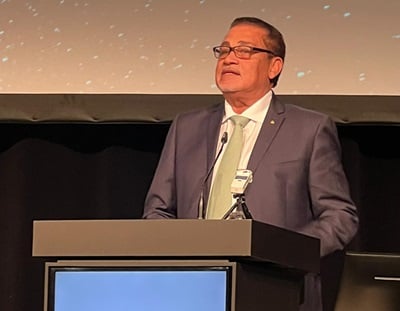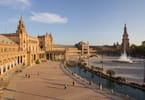PORTUGAL (eTN) – For the wealthy, it seems that five-stars simply aren’t enough when it comes to staying in a hotel. Butlers, Bentleys, and caviar are “de rigueur” and pampering to the needs of guests who have everything are self-proclaimed seven-star properties like the Town House Galleria in Milan, and Dubai’s Burj Al Arab Hotel. The seven-stars rate, like the half dozen, doesn’t officially exist. But the lure of bedding down for the night at a famously prestigious address is undeniably compelling.
Currently under construction, the Conrad Palácio da Quinta Hotel Resort & Spa is set to become Europe’s first six-star service hotel property. Marketed enthusiastically by Conrad, the luxury arm of Hilton, and developers The Imocom Group as “one of the most sought-after addresses in Europe,” the Palácio can only be officially classified by Turismo de Portugal, the central public authority responsible for promotion, enhancement, and sustainability of the country’s tourism activities, as a five-star hotel and resort. It is the guest services on offer – private butler and chef, personal maid, private jet and yacht charter, health spa and world-class restaurants, among them – that justify the unofficial extra star.
“Conrad-Hilton wanted to push the envelope forward on the hotel design,” said Rui Vieira Grego, managing partner of architectural practice Palmer-Grego Arquitectos, based in Estoril on the Lisbon coast. “It had to reflect a palatial look. That was important as a distinguishing factor.”
Working on the project as a joint venture with Seifert Architects (now known as Sigma), a London-based practice responsible for the design concept, Palmer-Grego’s brief was to maintain a sense of the contemporary within a palatial setting.
“They – Conrad-Hilton – also insisted on a sense of place,” added co-managing partner Noémia Palmer. “The color scheme chosen for the interior is subtle – a light, stylish, and modern interpretation that reflects a North African-Algarve influence.”
Rooms easily surpass the requirements for a five-star property as stipulated by Turismo de Portugal in terms of size and amenities. The hotel is to comprise 158 rooms and suites, including an enormous presidential suite complete with private elevator, spa, and swimming pool. A further 78 condominiums form the Palácio da Quinta Apartments.
“But where you really do get the distinction at Palácio is with the service offered,” pointed out Grego. “This is where you can see the difference between a theoretical six-star and five-star hotel. Ultimately, it’s the service that counts. Clients will come back if they are well accommodated and well treated.”
A comprehensive survey conducted by Lisbon-based hotel management consultancy ILM Advisory in partnership with Algarve boutique hotel Vila Joya and local PR company Yellow Kite makes interesting reading.
The main objective of the survey was to understand the market’s current perception of luxury hotel and travel experiences, and the preference of people regarding them.
The study, published December 2009, concluded that key words that best describe luxury hotels are: service, quality, and comfort.
Quality and personalized service are crucial aspects to be considered when speaking about luxury products and services. So, too, is location.
“These days, hotel staff have to be tremendously professional,” said Miguel Júdice, president of the Associção da Hoteleria de Portugal (AHP-Portuguese Hotel Association) general council.
“There are some very good five-star hotels in Europe, so anyone providing a six-star service would first have to meet all the criteria associated with a five-star property. You have to deliver on every aspect.”
A six-star rating raises the bar substantially, added Júdice, who is also the CEO of the Lágrimas Hotels group, “and there is always a risk that goes with that because in effect you are promising more.”
Given the impending arrival of six-star service in Portugal, does Júdice see a trend evolving for this style of hotel and resort operation?
“Frankly, no. I don’t think we have the market for six-star branding. Instead I see five-star properties offering more of a premium service. There have always been different shades of five-star – some luxury hotels are better than others, some cost more than others. Some might even hint at a six-star service, but it’s unlikely that we will see a trend towards it.”
Portugal does, however, appear to be attracting some major new players in the luxury hotel market. This is illustrated by the fact that Amanresorts, one of the world’s most exclusive hotel groups, is planning to open no less than three resorts in the country over the next decade. Considered some of the best in terms of service, design, and location, Aman properties don’t adhere to any star rating. Reputation alone is the group’s most potent marketing tool.
And despite continuing global economic woes, other new luxury hotel construction is forging ahead in Portugal. In the Algarve projects like E3’s The Keys at Quinta do Lago ally purpose-built upscale resorts with the country’s most iconic of tourism leisure products – golf.
“Golf is hugely important to Portugal’s economy, and is a major driver in resort development and residential tourism,” said The Keys’ sales director Christian de Ponte.
The Portuguese government has recognized this importance and its National Strategic Plan for Tourism (PENT) – which defines the initiatives that will foster sustained growth of Portuguese tourism over the next decade – has identified the sport as one of the 10 most important products that should underpin the development strategy for the Portuguese tourism industry.
“Portugal’s abundant golf amenities provide a major factor in tourists’ choice of location for a holiday or the purchase of a second home,” underlined de Ponte.
The Keys – Key Lago, Key Pointe, and Key Verde, a range of villas positioned over a string of lakes – is enjoying robust pre-sales interest, and one of The Keys locations, Key Pointe, will feature a six-star hotel – the second planned for the region.
“The star-rating system has and will probably always remain the most reliable hallmark of hotel quality,” noted The Keys’ product director Jarod Smith. “Up until a few years ago, the star system topped out, with five stars being the most luxurious. The term ‘six-star’ is used to denote those value-added services that go above and beyond the usual offering of a five-star property.”
The Keys is set to offer a personal concierge, or butler service, and, like the Palácio, will also provide guests with a private chef, sommelier, and personal spa therapist, among other luxury trimmings.
“As Portugal’s tourist offering matures, it is naturally beginning to attract hotel and resort operators who bring a six-star service as a means to differentiate themselves,” explained Smith. “Portugal is right to welcome this change for it comes with service skill-sets which have been carefully designed and honed over many years, often in some of the world’s most foremost tourist destinations. Furthermore, the national workforce will gain exposure and valuable insight into the processes and procedures of internationally recognized service excellence.”
ABUBUWAN DA ZA KU GUDU DAGA WANNAN LABARI:
- Marketed enthusiastically by Conrad, the luxury arm of Hilton, and developers The Imocom Group as “one of the most sought-after addresses in Europe,” the Palácio can only be officially classified by Turismo de Portugal, the central public authority responsible for promotion, enhancement, and sustainability of the country's tourism activities, as a five-star hotel and resort.
- Working on the project as a joint venture with Seifert Architects (now known as Sigma), a London-based practice responsible for the design concept, Palmer-Grego's brief was to maintain a sense of the contemporary within a palatial setting.
- A six-star rating raises the bar substantially, added Júdice, who is also the CEO of the Lágrimas Hotels group, “and there is always a risk that goes with that because in effect you are promising more.






















